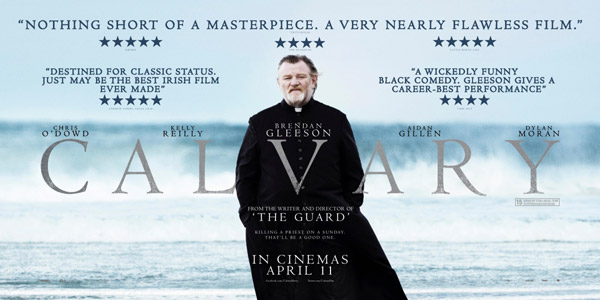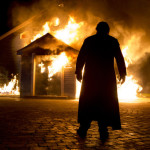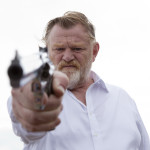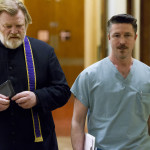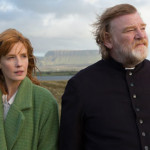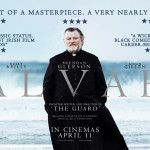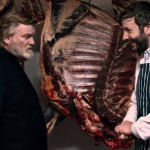Calvary: The hill near Jerusalem on which Jesus was crucified. The name is Latin for “Place of the Skull”; it is also called Golgotha.
I’m a huge admirer of Brendan Gleeson, whom I’d class as an actor’s actor – the sort that turns in beautifully observed and subtly nuanced and professional performances time and again, whether as star, leading man, cameo artiste or ensemble player, never hogs the limelight and understates to magnificent effect. If you’ve seen In Bruges and The Guard you’ll know exactly what I mean, though those are both cult movies at heart.
Gleeson won more public acclaim for his role as “Mad-Eye” Moody in the Harry Potter franchise, for a more serious role in Suffragette, and indeed for portraying Churchill in Into The Storm. Needless to say, he was excellent in all these and more, but that’s the kind of hard-working actor he is.
As an idealistic but disheartened Irish priest in Calvary, a black comedy in which he has a moral dilemma to unravel, he is surely on home turf. Father James Lavelle only wishes to do good, but is justifiably shocked and saddened by the behaviours of his flock. Gleeson brings the depth you would expect, but in so doing exposes for a fraud the commitment he has brought to the community and the care he has shown his self-harming daughter Fiona.
The film, written and directed by John Michael McDonagh of The Guard fame, opens with Fr James in a confession with a parishioner who promises to kill the innocent priest a week hence as revenge for the appalling sexual abuse this man suffered in childhood at the hands of another priest, now long dead. Since he was innocent at the time, it makes sense to choose an innocent priest to carry the can and atone on behalf of the Catholic Church.
His Bishop leaves it to James to decide whether or not to go to the police. In the course following week James goes through the full spectrum of emotions about whether he can face his own personal Calvary, while dealing as the entrusted counsellor with the complex forces below the surface in the small Irish town, and trying to resurrect his relationship with the daughter he fathered with his late wife before turning to the priesthood, who has returned while recovering from a failed suicide attempt.
Oh, and James’s faithful and beloved golden retriever is murdered and the church burned to the ground too. Small wonder then that the good father is struggling to cope and takes out his frustrations on David Wilmot‘s pious hypocrite, Father Leary. The local characters, beautifully drawn to a man and woman, certainly don’t help. Each is challenging and morally corrupt in his or her individual way, and all unlikeable.
There is Veronica (Orla O’Rourke), who has an Ivorian lover (Isaach de Bankolé) and who has been hit by either desperate husband and fellow cocaine-snorter Jack (Chris O’Dowd), her lover or someone else; there is the rich but unhappy and distasteful Michael Fitzgerald (Dylan Moran), who attempts to absolve his conscience by donating money obtained by dubious and possibly illegal means (including pissing on an expensive painting).
There is the cynical atheist dentist Frank Harte (Aidan Gillan), who loves nothing better than winding the priest up, particularly with a story of a 3-year old boy rendered blind, deaf, mute and paralysed thanks to a botched anaesthetic. There are others, but you get the picture.
If this sounds little like a comedy, there are glorious verbally grisly encounters and some delicious lines and acerbic wit from beginning to end. Try this for size:
“I think she’s bipolar, or lactose intolerant, one of the two.”
A couple of longer examples are quoted at the bottom to give you a flavour of the sort of dialogue we’re talking about, some of which would not be out of place in Father Ted. In short, this is a witty script that can be enjoyed on its own merits, but seen in the full context takes on a far darker hue. Calvary takes on a multi-layered character that differentiates it from more two-dimensional studies about Irish village life, the challenges and hypocrisies of the priesthood, and indeed our attitudes to death.
I don’t think it would be too much of a spoiler to say Fr James dies at the end, though I’ll leave you to determine the circumstances. However, the bigger question is whether he made a significant impact on the lives of his flock, to which the answer would appear to be no; presumably the next priest appointed would attempt and fail in the way that all predecessors had limited impact in halting the moral decline of the town.
As such, this is a downbeat ending to a powerful film, one that will certainly not please all viewers. It pleases this viewer, though not quite as much as either The Guard or In Bruges. That it does not is certainly not the fault of the wonderful Gleeson. I love the way that James apparently turns a blind eye to the fallibilities of the locals, other than trying to achieve justice for each and find a better way of living from each encounter; however, each takes its toll, to the point where he explodes in a fit of morbid drunken fury – at which point others are duly shocked. Fine acting, of the sort that is rarely rewarded with gongs but contributes to a fine body of work from a masterly career.
___
“I’ve always felt there’s something inherently psychopathic about joining the army in peacetime. As far as I’m concerned, people join the army to find out what its like to kill someone. I hardly think that’s an inclination that should be encouraged in modern society, do you? Jesus Christ didn’t think so, either. And the commandment “Thou shalt not kill” does not have an asterisk beside it, referring you to the bottom of the page where you find a list of instances where it’s okay to kill people”
“I have had murderous feelings, though, I have to admit. Not getting laid, it’s starting to make me feel really angry towards women. And so I thought, well, if I join the Army, those inclinations, as you call them, would be seen as a plus. On your application, like. They don’t come right out and say that’s what they’re looking for. In the advertisements, it’s all about seeing the world and all that shite. But I would assume that wanting to murder someone would be like having a degree in engineering, you know, it would outweigh my lack of qualifications.”

